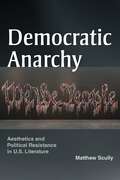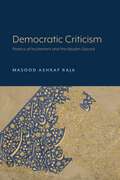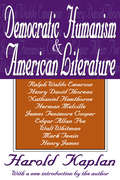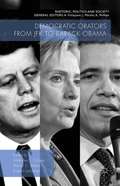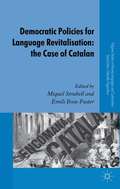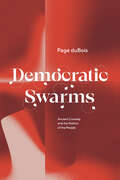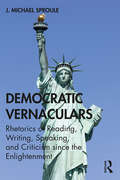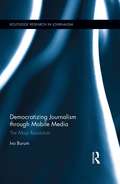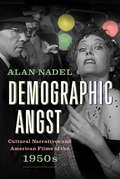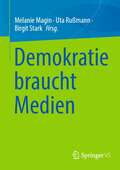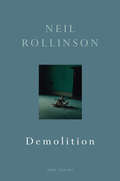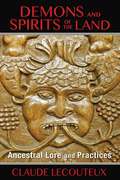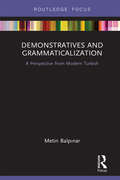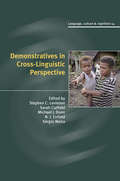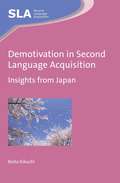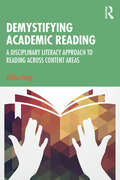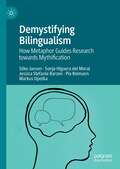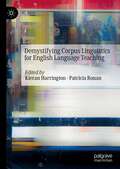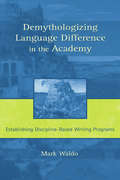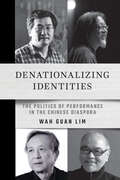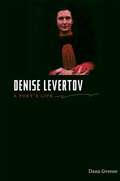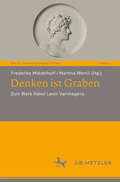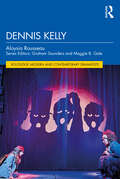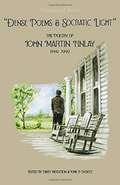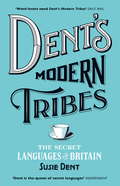- Table View
- List View
Democratic Anarchy: Aesthetics and Political Resistance in U.S. Literature
by Matthew ScullyA dramatic and necessary rethinking of the meaning of DemocracyDemocratic Anarchy grapples with an uncomfortable but obvious truth inimical to democracy: both aesthetics and politics depend on the structuring antagonism of inclusion and exclusion. Yet in Democratic Anarchy, Matthew Scully asks, how can “the people” be represented in a way that acknowledges what remains unrepresentable? What would it mean to face up to the constitutive exclusions that haunt U.S. democracy and its anxious fantasies of equality?Synthesizing a broad range of theoretical traditions and interlocutors—including Lacan, Rancière, Edelman, and Hartman—Democratic Anarchy polemically declares that there has never been, nor can there ever be, a realized democracy in the U.S. because democracy always depends on the hierarchical institution of a formal order by one part of the population over another. Engaging with an expansive corpus of American literature and art (Harriet Jacobs, Nathaniel Hawthorne, Louis Zukofsky, Thomas Pynchon, Toni Morrison, Theresa Hak Kyung Cha, Nari Ward, Ocean Vuong, and Safiya Sinclair), Democratic Anarchy argues that many liberal concepts and institutions are in fact structurally opposed to democratic equality because they depend on regulating what can appear and in what form.By focusing on works that disrupt this regulatory impulse, Scully shows how rhetorical strategies of interruption, excess, and disorder figure the anarchic equality that inegalitarian fantasies of democracy disavow. Democratic Anarchy develops a rigorous theory of equality that refuses to repeat the inequalities against which it positions itself, and it does so by turning to moments of resistance—both aesthetic and political—inaugurated by the equality that inheres in and antagonizes the order of things.
Democratic Criticism: Poetics of Incitement and the Muslim Sacred
by Masood Ashraf RajaAfter the publication of Salman Rushdie’s The Satanic Verses (1988), the poetics of incitement— found in texts originating in the West containing themes and representations of Islam hurtful to Muslims—became an accepted method of textual production in the West. Production of such texts intensified after the attacks of 9/11. Democratic Criticism: Poetics of Incitement and the Muslim Sacred by Masood Ashraf Raja urges a new mode of reading, one that permits Western readers to transcend local reading practices in order to, as best as one can, read from the point of view of the Other. Raja argues that the lack of understanding of Muslim responses to the poetics of incitement in the West is the result of a lack of cross-cultural knowledge. He claims metropolitan universities often do not teach the proper social, historical, and religious context required for effectively reading these texts with any form of cultural knowledge. To remedy this, Raja offers and theorizes “democratic reading practices” and new ways for students to engage with texts. A genealogy of the Muslim Sacred is included, thereby giving readers the history and specific knowledge that constitutes an average Muslim reader of these texts, a subject who should be imagined and empathized with when those in the West read works of the poetics of incitement. Democratic Criticism encourages Western readers to develop a deeper understanding of the meaning-making processes of the Islamic world while at the same time encouraging the Muslim readers to read representations of the Islamic world with a more expansive understanding. It will be a helpful tool in creating reading practices that allow both teachers and students of literature to transcend their mode of reading as universal and to read from the perspective of the Other, and allow readers to engage meaningfully with these texts. Students and scholars of world literature, history, and religious studies will find this book insightful and valuable.
Democratic Humanism and American Literature
by Harold KaplanDemocratic Humanism and American Literature illustrates the interplay between democratic assumptions and literary performance in the America's classic nineteenth-century writers--Emerson, Thoreau, Hawthorne, Melville, Cooper, Poe, Whitman, Twain, and James. Harold Kaplan suggests that these major figures' works are linked by the myths of genesis of a new political culture. Challenged by the democratic ideal, and committed to it, they wrote prophetic books in the American liberal tradition and endowed its ethical intelligence.The task of stating a new and undefined freedom was always implicit and often in the foreground of the writing of these nineteenth-century giants. As the author describes the situation, "the free man had to decide in what sense he was bound by nature or could master it; in what sense he was committed to his society and could reconcile his freedom with it." These classic writers devoted their work to examining this dialectic of values; Kaplan sees their complex and polarized democratic consciousness as seminal in the imaginative tradition they generated. What is unique in that tradition of values is the rivalry of criticism with affirmations of faith. "The highly original ethical trait involved here is based on the capacity of a political society to use its negations against itself and survive."The author suggests that in our own time moral judgments are more likely to be the province of activist politics than literature. His new introduction relates the theme of the book to cultural and political developments in the American experience of modernity and adds a discussion of Wallace Stevens and William Carlos Williams to the figures treated in the original edition. Since tendencies to develop ideological and idiosyncratic responses to extrinsic events have grown stronger over time, it is more important than ever for scholars and students alike to recover a "moral imagination"--the force that gave rise to the great literary works of the nineteenth century. To describe that force is Harold Kaplan's goal in Democratic Humanism and American Literature.
Democratic Orators from JFK to Barack Obama (Rhetoric, Politics And Society Ser.)
by Robert Lehrman David Moon Andrew CrinesHow do leading Democratic Party figures strive to communicate with and influence their audience? Why have some proven more successful than others in advancing their ideological arguments? How do orators seek to connect with different audiences in different settings such as the Senate, conventions and through the media? This thoroughly researched and highly readable collection comprehensively evaluates these questions as well as providing an extensive interrogation of the political and intellectual significance of oratory and rhetoric in the Democratic Party. Using the Aristotelian modes of persuasion ethos, pathos and logos it draws out commonalties and differences in how the rhetoric of Democratic Party politics has shifted since the 1960s. More broadly it evaluates the impact of leading orators upon American politics and argues that effective oratory remains a vital party of American political discourse.
Democratic Policies for Language Revitalisation: the Case of Catalan
by Emili Boix-Fuster Miquel StrubellA collection of studies offering an up-to-date analysis of official policies to promote Catalan in a democratic framework in each of the main Spanish regions where it is spoken: Catalonia, Valencia and the Balearic Islands.
Democratic Swarms: Ancient Comedy and the Politics of the People
by Page duBoisConsiders how ancient Greek comedy offers a model for present-day politics. With Democratic Swarms, Page duBois revisits the role of Greek comedy in ancient politics, considering how it has been overlooked as a political medium by modern theorists and critics. Moving beyond the popular readings of ancient Greece through the lens of tragedy, she calls for a revitalized look at Greek comedy. Rather than revisiting the sufferings of Oedipus and his family or tragedy’s relationship to questions of sovereignty, this book calls for comedy—its laughter, its free speech, its wild swarming animal choruses, and its rebellious women—to inform another model of democracy. Ancient comedy has been underplayed in the study of Greek drama. Yet, with the irrepressible energy of the comic swarm, it provides a unique perspective on everyday life, gender and sexuality, and the utopian politics of the classical period of Athenian democracy. Using the concepts of swarm intelligence and nomadic theory, duBois augments tragic thought with the resistant, utopian, libidinous, and often joyous communal legacy of comedy, and she connects the lively anti-authoritarianism of the ancient comic chorus with the social justice movements of today.
Democratic Vernaculars: Rhetorics of Reading, Writing, Speaking, and Criticism since the Enlightenment
by J Michael SprouleDemocratic Vernaculars is a comprehensive, culturally inclusive, and thematically unified history of the communicative, audience-centered rhetorical vernacular that occupies the “middle range” of English, bounded on the one side by expressive structure (grammar and linguistics) and on the other by aesthetics (literature). Broadening the history of rhetoric by considering a vast collection of vernacular resources such as elementary grammars and readers, popular guidebooks, textbooks, and rhetorical treatises, this book advances the history of the rhetorical theory and pedagogy since the 17th century by examining ways in which diverse vectors of the rhetorical vernacular coalesced to produce an English language sufficiently idiomatic for practical social exchange while being, at the same time, suitable for higher literary, scholarly, and cultural pursuits. Democratic Vernaculars is essential reading for scholars in rhetoric and the histories of language and education, and can serve as a text for upper-division undergraduate and graduate courses in rhetoric.
Democratizing Journalism through Mobile Media: The Mojo Revolution (Routledge Research in Journalism)
by Ivo BurumFuelled by a distrust of big media and the development of mobile technologies, the resulting convergence of journalism praxis (professional to alternative), workflows (analogue to multipoint digital) and platforms (PC to mobile), result in a 24-hour always-on content cycle. The information revolution is a paradigm shift in the way we develop and consume information, in particular the type we call news. While many see this cultural shift as ruinous, Burum sees it as an opportunity to utilize the converging information flow to create a galvanizing and common digital language across spheres of communication: community, education and mainstream media. Embracing the digital literacies researched in this book will create an information bridge with which to traverse journalism’s commercial precarity, the marginalization of some communities, and the journalism school curricula.
Demographic Angst: Cultural Narratives and American Films of the 1950s
by Alan NadelProlific literature, both popular and scholarly, depicts America in the period of the High Cold War as being obsessed with normality, implicitly figuring the postwar period as a return to the way of life that had been put on hold, first by the Great Depression and then by Pearl Harbor. Demographic Angst argues that mandated normativity—as a political agenda and a social ethic—precluded explicit expression of the anxiety produced by America’s radically reconfigured postwar population. Alan Nadel explores influential non-fiction books, magazine articles, and public documents in conjunction with films such as Singin’ in the Rain, On the Waterfront, Sunset Boulevard, and Sayonara, to examine how these films worked through fresh anxieties that emerged during the 1950s.
Demokratie braucht Medien
by Uta Rußmann Melanie Magin Birgit StarkFreie und unabhängige Medien sind die Grundlage einer lebendigen Demokratie. In normativen Demokratiemodellen wird die „Wächterrolle“ von Medien betont, weil neben der Kontroll- und Informationsfunktion der Medien ihr Beitrag zur Legitimierung politischer Prozesse als zentral angesehen wird. Medien unterliegen jedoch im digitalen Wandel einem hohen Anpassungsdruck: Sie drohen ihre traditionelle Gatekeeper-Rolle zu verlieren und konkurrieren mit globalen Tech-Giganten wie Facebook und Google um Werbegelder und die Aufmerksamkeit des Publikums. Die Plattformisierung der Medien stellt nicht nur die Vermittlungsleistungen professioneller journalistischer Informationsanbieter in Frage, sondern auch die Rolle der Medien in der Herstellung von Öffentlichkeit. Der Band hinterfragt die sich wandelnde Rolle der Medien im politischen System sowie das Verhältnis von Medien und Politik kritisch. Funktionen und Autonomiegrad von Medien und Journalismus werden analysiert. Mithilfe von Zeitvergleichen werden tiefgreifende Veränderungen wie auch Konstanten herausgearbeitet. Nicht zuletzt gilt es zu erörtern, welche Akteure welche Verantwortung tragen und welche Privilegien sie genießen (sollten).
Demolition
by Neil RollinsonWith the frank, subversive, and very funny poems in his first two books, Neil Rollinson established himself as a deft cartographer of the sensual world. While a rich and tactile eroticism still courses through Demolition, there is a new seriousness here, as mortality starts to throw its long shadow. These poems occupy a more rueful, reflective space - provisional, mercurial and fragile - a darker place where disintegration and loss are the only certainties, and memory is the only solid ground. Central to this is the death of the father - whether the poet's own, or the lost fathers of Borges or Vallejo - and the theme is broadened through a number of moving examinations of the erosion of time and youth. Against this gathering darkness, Rollinson sets a spirited defence, blending the lyric and vernacular voice in a muscular celebration of food, sex, sport and the natural world that is unusually refreshing, and sophisticated enough to allow both humour and profundity.The poems in Demolition never give up hope; they exhibit a tenacious optimism - or at least a steely pragmatism - that says: we have what we are given, there is no alternative, and we all must find what joy we can in life, and in its living.
Demons and Spirits of the Land: Ancestral Lore and Practices
by Claude LecouteuxAn exploration of the wild spirits that once roamed the lands and inhabited the waters and the pagan rites used to gain their good will • Explores medieval stories and folk traditions of brownies, fairies, giants, dragons, will-o’-the-wisps, and demons • Explains the specific rites performed to negotiate with the local spirits and ensure their permission before building on new land • Shows how these beliefs carried through to modern times, especially in architecture Our pagan ancestors knew that every forest has brownies and fairies, every spring its lady, and every river malevolent beings in its depths. They told tales of giants in the hills, dragons in the lakes, marshes swarming with will-o’-the-wisps, and demons and wild folk in the mountains who enjoyed causing landslides, avalanches, and floods. They both feared and respected these entities, knowing the importance of appeasing them for safe travel and a prosperous homestead. Exploring medieval stories, folk traditions, spiritual place names, and pagan rituals of home building and site selection, Claude Lecouteux reveals the multitude of spirits and entities that once inhabited the land before modern civilization repressed them into desert solitude, impenetrable forests, and inaccessible mountains. He explains how, to our ancestors, enclosing a space was a sacred act. Specific rites had to be performed to negotiate with the local spirits and ensure proper placement and protection of a new building. These land spirits often became the household spirit, taking up residence in a new building in exchange for permission to build on their territory. Lecouteux explores Arthurian legends, folk tales, and mythology for evidence of the untamed spirits of the wilderness, such as giants, dragons, and demons, and examines the rites and ceremonies used to gain their good will. Lecouteux reveals how, despite outright Church suppression, belief in these spirits carried through to modern times and was a primary influence on architecture, an influence still visible in today’s buildings. The author also shows how our ancestors’ concern for respecting nature is increasingly relevant in today’s world.
Demonstratives and Grammaticalization: A Perspective from Modern Turkish
by Metin BalpınarDemonstratives and Grammaticalization offers an in-depth analysis of the demonstrative system in Turkish. This book provides the first comprehensive analysis dealing with both the synchronic variations in Turkish demonstratives and their grammatical changes. It sheds light on the syntactic, semantic, and pragmatic properties of the demonstratives, systematically describes the various usages of these forms, and provides a unified explanation for the various accounts of their distribution. While the focus is on Turkish, this analysis contributes to our understanding of how a demonstrative system operates in a language with a three-way distinction.
Demonstratives in Cross-Linguistic Perspective (Language Culture and Cognition #14)
by David Wilkins Michael Dunn Stephen Levinson Sarah Cutfield Nick Enfield Sergio MeiraDemonstratives play a crucial role in the acquisition and use of language. Bringing together a team of leading scholars this detailed study, a first of its kind, explores meaning and use across fifteen typologically and geographically unrelated languages to find out what cross-linguistic comparisons and generalizations can be made, and how this might challenge current theory in linguistics, psychology, anthropology and philosophy. Using a shared experimental task, rounded out with studies of natural language use, specialists in each of the languages undertook extensive fieldwork for this comparative study of semantics and usage. An introduction summarizes the shared patterns and divergences in meaning and use that emerge.
Demotivation in Second Language Acquisition
by Keita KikuchiSLA literature tends to focus predominantly on what motivates language learners, but what demotivates them has not been widely discussed. This book, focusing exclusively on demotivation, will help readers to understand motivational issues from a different perspective. The aims of the work are threefold: to present the current developments of demotivation research in the field of SLA and bridge motivational theory/research and demotivation research; to promote the understanding of possible causes of demotivation; and to expand the focus of demotivation research through a reflection on current motivation theory/research and a discussion of methodological issues. The research presented in this book is situated in Japanese English-teaching contexts and will serve as a foundation for anyone wishing to better understand the causes of demotivation in SLA and to explore the topic in their own contexts.
Demystifying Academic Reading: A Disciplinary Literacy Approach to Reading Across Content Areas
by Zhihui FangFoundational and accessible, this book equips pre-service and practicing teachers with the knowledge, understanding, tools, and resources they need to help students in grades 4–12 develop reading proficiencies in four core academic subjects—literature, history, science, and mathematics. Applying a disciplinary literacy approach, Fang describes the verbal and visual resources, expert strategies, inquiry skills, and habits of mind that students must learn in order to read carefully, critically, purposefully, and with an informed skepticism across genres and content areas. He also shows how teachers can promote language learning and reading/literacy development at the same time that they engage students in content area learning. With informative synthesis and research-based recommendations in every chapter, this text prepares teachers to help students develop discipline-specific, as well as discipline-relevant, discursive insights, literacy strategies, and ways of thinking, reasoning, and inquiring that are essential to productive learning across academic subjects. It also provides teacher educators with approaches and strategies for helping teacher candidates develop expertise in academic reading instruction. In so doing, the book demystifies academic reading, revealing what it takes for students to read increasingly complex academic texts with confidence and understanding and for teachers to develop expertise that promotes disciplinary literacy. This state-of-the-art text is ideal for courses on reading/literacy methods and academic literacy and eminently relevant to all educators who want their students to become thoughtful readers and powerful learners
Demystifying Bilingualism: How Metaphor Guides Research towards Mythification
by Silke Jansen Sonja Higuera del Moral Jessica Stefanie Barzen Pia Reimann Markus OpolkaThis book analyses changing views on bilingualism in Cognitive Psychology and explores their socio-cultural embeddedness. It offers a new, innovative perspective on the debate on possible cognitive (dis)advantages in bilinguals, arguing that it is biased by popular “language myths”, which often manifest themselves in the form of metaphors. Since its beginnings, Cognitive Psychology has consistently modelled the coexistence between languages in the brain using metaphors of struggle, conflict and competition. However, an ideological shift from nationalist and monolingual ideologies to the celebration of bilingualism under multicultural and neoliberal ideologies in the course of the 20th century fostered opposing interpretations of language coexistence in the brain and its effects on bilinguals at different moments in time. This book will be of interest to students and scholars of Cognitive Psychology, Psycholinguistics, Multilingualism and Applied Linguistics, Cognitive and Computational Linguistics, and Critical Metaphor Analysis.
Demystifying Corpus Linguistics for English Language Teaching
by Kieran Harrington Patricia RonanThe aim of this edited volume is to demystify corpus linguistics for use in English language teaching (ELT). It advocates the inclusion of corpus linguistics in the classroom as part of an approach to ELT in which students engage with naturally occurring language. The first chapter provides a basic but essential introduction to corpus linguistics, including sections on corpora and corpus methods, and this is followed by a review of the use of corpus linguistics in ELT. Chapters on the traditional ELT strands of skills, vocabulary and grammar as well as chapters on pluricentric approaches (on language and culture, World Englishes and English as a Lingua Franca) flow naturally from the second chapter, which reports on a survey of the attitudes of trainee teacher to the use of corpus linguistics in the ELT classroom. The final two chapters show how the work of corpus linguists can benefit classroom teacher preparation, materials development and textbook writing. This book will be of interest not only to academics in fields such as English Language Teaching, Applied Linguistics and Corpus Linguistics, but also to educators of teacher-trainees and teacher-trainees themselves, as well as teachers who are looking for new interactive approaches to ELT.
Demythologizing Language Difference in the Academy: Establishing Discipline-Based Writing Programs
by Mark WaldoIn this volume, Mark Waldo argues that writing across the curriculum (WAC) programs should be housed in writing centers and explains an innovative approach to enhancing their effectiveness: focus WAC on the writing agendas of the disciplines. He asserts that WAC operation should reflect an academy characterized by multiple language communities--each with contextualized values, purposes, and forms for writing, and no single community's values superior to another's. Starting off with an examination of the core issue, that WAC should be promoting learning to write in the disciplines instead of writing to learn, Waldo proposes: *housing WAC in comprehensive writing centers independent of any other department; *using dialogue and inquiry rather than prescriptive techniques in the WAC program's interaction with faculty in other disciplines; and *phasing out writing assessment that depends on one test measuring the writing abilities of students from all disciplines. In the process of making his case, Waldo discusses tutor training, faculty consultancy, and multilayered assessment programs. In addition to presenting the theoretical and practical advantages of discipline-based WAC programs, he also offers clear and compelling evidence from his own institution that supports the success of this approach to writing instruction. Demythologizing Language Difference in the Academy: Establishing Discipline-Based Writing Programs will be of interest to writing program and WAC administrators; writing center administrators; graduate students studying composition; and educators and graduate students involved in WAC initiatives, research, and study.
Denationalizing Identities: The Politics of Performance in the Chinese Diaspora
by Wah Guan LimDenationalizing Identities explores the relationship between performance and ideology in the global Sinosphere. Wah Guan Lim's study of four important diasporic director-playwrights—Gao Xingjian, Stan Lai Sheng-chuan, Danny Yung Ning Tsun, and Kuo Pao Kun—shows the impact of theater on ideas of "Chineseness" across China, Taiwan, Hong Kong, and Singapore. At the height of the Cold War, the "Bamboo Curtain" divided the "two Chinas" across the Taiwan Strait. Meanwhile, Hong Kong prepared for its handover to the People's Republic of China and Singapore rethought Chinese education. As geopolitical tensions imposed ethno-nationalist identities across the region, these four dramatists wove together local, foreign, and Chinese elements in their art, challenging mainland China's narrative of an inevitable communist outcome. By performing cultural identities alternative to the ones sanctioned by their own states, they debunked notions of a unified Chineseness. Denationalizing Identities highlights the key role theater and performance played in circulating people and ideas across the Chinese-speaking world, well before cross-strait relations began to thaw.
Denise Levertov: A Poet's Life
by Dana GreeneKenneth Rexroth called Denise Levertov (1923-1997) "the most subtly skillful poet of her generation, the most profound, . . . and the most moving." Author of twenty-four volumes of poetry, four books of essays, and several translations, Levertov became a lauded and honored poet. Born in England, she published her first book of poems at age twenty-three, but it was not until she married and came to the United States in 1948 that she found her poetic voice, helped by the likes of William Carlos Williams, Robert Duncan, and Robert Creeley. Shortly before her death in 1997, the woman who claimed no country as home was nominated to be America's poet laureate. Levertov was the quintessential romantic. She wanted to live vividly, intensely, passionately, and on a grand scale. She wanted the persistence of Cézanne and the depth and generosity of Rilke. Once she acclimated herself to America, the dreamy lyric poetry of her early years gave way to the joy and wonder of ordinary life. By the late 1960s and early 1970s, however, her poems began to engage the issues of her times. Vehement and strident, her poetry of protest was both acclaimed and criticized. The end of both the Vietnam War and her marriage left her mentally fatigued and emotionally fragile, but gradually, over the span of a decade, she emerged with new energy. The crystalline and luminous poetry of her last years stands as final witness to a lifetime of searching for the mystery embedded in life itself. Through all the vagaries of life and art, her response was that of a "primary wonder." In this illuminating biography, Dana Greene examines Levertov's interviews, essays, and self-revelatory poetry to discern the conflict and torment she both endured and created in her attempts to deal with her own psyche, her relationships with family, friends, lovers, colleagues, and the times in which she lived. Denise Levertov: A Poet's Life is the first complete biography of Levertov, a woman who claimed she did not want a biography, insisting that it was her work that she hoped would endure. And yet she confessed that her poetry in its various forms--lyric, political, natural, and religious--derived from her life experience. Although a substantial body of criticism has established Levertov as a major poet of the later twentieth century, this volume represents the first attempt to set her poetry within the framework of her often tumultuous life.
Denken ist Graben: Zum Werk Rahel Levin Varnhagens (Neue Romantikforschung #6)
by Frederike Middelhoff Martina WernliDie Schriften Rahel Levin Varnhagens (1771–1833) sind ästhetisch und thematisch komplex. Sie umfassen kleine Formen, u.a. Aphorismen und Lektürereflexionen, ebenso wie lange Tagebucheinträge und umfangreiche Briefwechsel mit beinahe dreihundert Personen. Auszüge ihrer Texte wurden bereits zur Lebzeit Levin Varnhagens publiziert. Die im vorliegenden Band versammelten Beiträge zielen darauf ab, Rahel Levin Varnhagens Texte sowie die damit verknüpften weitreichenden Lektüren und Kontexte in ihren materiellen, ästhetischen, poetologischen und soziohistorischen Dimensionen zu erkunden und vor dem Hintergrund romantischer Konzepte und epistolarer Kommunikationsformen zu diskutieren. Darüber hinaus gibt der Band Einblick in ausgewählte Handschriften (Tagebuch A) sowie in ein bislang unpubliziertes Ausgabenbuch der Romantikerin.
Dennis Kelly (Routledge Modern and Contemporary Dramatists)
by Aloysia RousseauDennis Kelly explores Kelly’s unusual career path and sheds light on his eclectic approach to the arts, characterised by a refusal to write texts that people can fit within neat categories. This is the first monograph on Kelly’s work for stage and screen and brings to light his essential contribution to contemporary British drama and his huge range of work including his rise to international fame with Matilda the Musical.Drawing on Kelly’s published and unpublished texts, his work in production, reviews, original interviews with directors, actors and with Kelly himself as well as critical theory, Dennis Kelly examines and reappraises key motifs in his work such as his preoccupation with violence, the complex relationship between the individual and the community or his emphasis on storytelling. It also offers new insights into overlooked aspects of Kelly’s work by setting out to explore his traumatic narratives and his post-romanticism. In keeping with Kelly’s wish never to repeat himself, this study offers multiple critical entries into his plays, television series and films, drawing on moral and political philosophy, trauma studies, studies in humour, feminist theory and film studies.Part of the Routledge Modern and Contemporary Dramatist series, Dennis Kelly is addressed to students and scholars in Drama, Theatre and Performance as well as theatre practitioners and offers in-depth analysis of one of the most unique and challenging voices in contemporary British playwriting and screenwriting.
Dense Poems and Socratic Light: The Poems of John Martin Finlay
by David Middleton John Martin Finlay John P DoucetThis Wiseblood Book edition of Finlay’s poetry and related writings is the most comprehensive edition to date, including many previously uncollected and unpublished materials. John Finlay’s poems are almost all in traditional literary forms. Whether plain-style, narrative, or post-symbolist, Finlay’s poems are serious, simple, deep, direct, and often traumatically revealing of the human condition. The best of them are truly unforgettable. <p><p> Finlay addresses such subjects as the origin of the mind, the relation of mind and matter, mind and the irrational, mind and God, the nature of evil, Thomistic theology, philosophical subjectivism, the inscrutability and beauty of the natural world, primitive religious rituals, and, especially in the later poems, family life in the South since the early nineteenth century, Indian life in the South, the nature of modern war, and the isolation of the serious thinker and artist in the contemporary world. <p> Readers who want serious poems that vividly present sensuous experience as understood by a mature mind steeped in classical and Christian tradition, yet fully aware of the problems of the contemporary world and of the perpetual threat of the primitive and the irrational, should find much here to contemplate. In their severe and uncompromising grandeur John Finlay’s best poems are surely permanent additions to American literature.
Dent's Modern Tribes: The Secret Languages of Britain
by Susie DentDid you know that . . . a soldier's biggest social blunder is called jack brew - making yourself a cuppa without making one for anyone else? That twitchers have an expression for a bird that can't be identified - LBJ (the letters stand for Little Brown Job)? Or that builders call plastering the ceiling doing Lionel Richie's dancefloor? Susie Dent does.Ever wondered why football managers all speak the same way, what a cabbie calls the Houses of Parliament, or how ticket inspectors discreetly request back-up? We are surrounded by hundreds of tribes, each speaking their own distinct slanguage of colourful words, jokes and phrases, honed through years of conversations on the battlefield, in A&E, backstage, or at ten-thousand feet in the air. Susie Dent has spent years interviewing hundreds of professionals, hobbyists and enthusiasts, and the result is an idiosyncratic phrasebook like no other. From the Freemason's handshake to the publican's banter, Dent's Modern Tribes takes us on a whirlwind tour of Britain, decoding its secret languages and, in the process, finds out what really makes us all tick.
